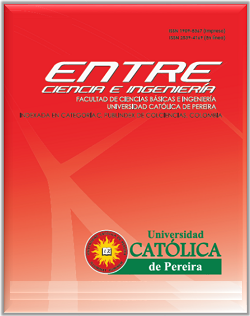Un algoritmo de control de potencia para WLAN basadoen Teoría de Juegos
DOI:
https://doi.org/10.31908/19098367.4017Palabras clave:
Control de potencia, IEEE 802.11, interferencia, SDR, teoría de juegos, WLAN.Resumen
La ubicuidad y el amplio despliegue de redes inalámbricas de área local (WLAN) han aumentado el riesgo inherente de interferencia. En numerosos estudios se ha demostrado que el control de potencia es una alternativa eficiente para hacer frente a esta situación y una técnica sobresaliente para realizar control de potencia es la teoría de juegos (GT). Sin embargo, la investigación en este campo se ha enfocado en desarrollos teóricos y simulación a nivel de sistema dada la complejidad de implementar control de potencia en un entorno real. Este artículo presenta la implementación de un algoritmo de control de potencia basado en teoría de juegos en redes WLAN, específicamente en el estándar IEEE 802.11 a través de plataformas de radio definidas por software (SDR, Software Defined Radio) y hardware reconfigurable. Los resultados demuestran que el algoritmo aumenta significativamente el ahorro de energía y la eficiencia energética de las STA y disminuye la interferencia. Esta reducción de interferencia mejora el rendimiento general de la red, disminuyendo la FER y aumentando la velocidad de datos
Referencias
Qureshi, A. “Interference diagnosis in wireless systems by using NI USRP,” Int. J. Simul. Syst. Sci. Technol., vol. 16, no. 6, p. 10.1-10.10, 2015.
Wang, I., and Chang, L. “Impact of power control on performance of IEEE 802.11 wireless networks,” IEEE Trans. Mob. Comput., vol. 6, no. 11, pp. 1245–1258, 2007.
Chang, C., and Chang, H. “Power control and fairness MAC mechanisms for 802.11 WLANs,” Comput. Commun., vol. 30, no. 7, pp. 1527–1537, 2007.
Qiao, D., Choi, S., and Shin, K. G. “Interference analysis and transmit power control in IEEE 802.11a/h wireless LANs,” IEEE/ACM Trans. Netw., vol. 15, no. 5, pp. 1007–1020, 2007.
Mackenzie, A. B., and Wicker, S. B. “Game Theory in Communications: Motivation, Explanation, and Application to Power Control,” in GLOBECOM ’01, 2001, pp. 821–826.
Cheng, Z., Zhou, X., Ding, Y., and Miao, X. “A Cooperative Differential Game of Transmission Power Control in Wireless Networks,” Wirel. Pers. Commun., vol. 72, no. 4, pp. 2015–2027, 2013.
Huehn, T., and Sengul, C. “Practical power and rate control for WiFi,” 21st Int. Conf. Comput. Commun. Networks, ICCCN, 2012.
Mirama, V., and Quintero, V. “Control de potencia basado en teoría de juegos en sistemas de comunicaciones inalámbricas,” Gerenc. Tecnol. Inform., vol. 15, pp. 69–78, 2016.
Romp, G. “Experimental Economics,” in Game Theory Introduction and applications., Oxford University Press, Ed. New York: Oxford University Press, 1997, pp. 229–262.
Hamidou, S. L. “A very short tour of Game Theory,” in Game Theory and Learning for Wireless Network, Fundamentals and Applications, Oxford: Academic Press, 2011, pp. 3–40.
Smith, D. B., Portmann, M., Tan, W. L., and Tushar, W. “Multi-source-destination distributed wireless networks: Pareto-efficient dynamic power control game with rapid convergence,” IEEE Trans. Veh. Technol., vol. 63, no. 6, pp. 2744–2754, 2014.
Hoyos, E., Trujillo, D., and Bermudez, H. “Access point selection in 802.11 Wireless networks ensuring minimum capacity for QoS based on power control,” vol. 10, pp. 167–177, 2013.
El-Sabe, Y. M., Esameldin, M., and Ashour, M. “Enhanced Rank Based Cooperative Game (ERBCG) strategy for IEEE 802.11s Mesh WLAN power management,” 2013 9th Int. Wirel. Commun. Mob. Comput. Conf. IWCMC 2013, pp. 375–380, 2013.
Suman, S. K., Kumar, D., and Bhagyalakshmi, L. “SINR pricing in non-cooperative power control game for wireless ad hoc networks,” KSII Trans. Internet Inf. Syst., vol. 8, no. 7, pp. 2281–2301, 2014.
Suman, S. K., Kumar, D., and Bhagyalakshmi, L. “Non cooperative power control game with new pricing for wireless ad hoc networks,” Int. Rev. Comput. Softw., vol. 9, no. 1, pp. 18–28, 2014.
Kim, S. “Adaptive online power control scheme based on the evolutionary game theory,” IET Commun., vol. 5, no. 18, pp. 2648–2655, 2011.
Michalski, M., and Michalski, K. “A simple performance-boosting algorithm for transmit power control in WLAN access points,” 2016 21st Int. Conf. Microwave, Radar Wirel. Commun. MIKON 2016, pp. 4–7, 2016.
Park, B. H., Kwon, Y. M., Bae, S. J., and Chung, M. Y. “Implementation of connection management scheme of mobile stations in IEEE 802.11 WLAN APs considering transmission power control,” IEEE 2013 Tencon - Spring, TENCON Spring 2013 - Conf. Proc., pp. 515–519, 2013.
Cárdenas, M., and Chapid, J. “Implementación de un algoritmo de control de potencia basado en la teoría de juegos en un sistema multicelular limitado por interferencia con portadora única.,” 2015.
Cerón, A., and Rosero, D. “Incidencia de un algoritmo de control de potencia en la capacidad de una red heterogénea.,” Universidad del cauca, Popayán, 2016.
Bloessl, B., Segata, M., Sommer, C., and Dressler, F. “An IEEE802.11a/g/p OFDM Receiver for GNU Radio,” Proc. 2013 2nd ACM SIGCOMM Work. Softw. Radio Implement. Forum {(SRIF)}, pp. 9–15, 2013.
Ettus Research, “USRP B200/B210 Specification Sheet,” Ettus Research, 2014. [Online]. Available: https://www.ettus.com/content/files/b200-b210_spec_sheet.pdf.




 <
<


 Revista Entre Ciencia e Ingeniería
Revista Entre Ciencia e Ingeniería .png) entrecei@ucp.edu.co
entrecei@ucp.edu.co.png) ISSN (Impreso) 1909-8367 - ISSN (En Línea) 2539-4169
ISSN (Impreso) 1909-8367 - ISSN (En Línea) 2539-4169 Attribution-NonCommercial 4.0 International (CC By-NC 4.0)
Attribution-NonCommercial 4.0 International (CC By-NC 4.0)
.png) Carrera 21 No. 49-95 Av. de las Américas, Pereira, Risaralda, Colombia
Carrera 21 No. 49-95 Av. de las Américas, Pereira, Risaralda, Colombia